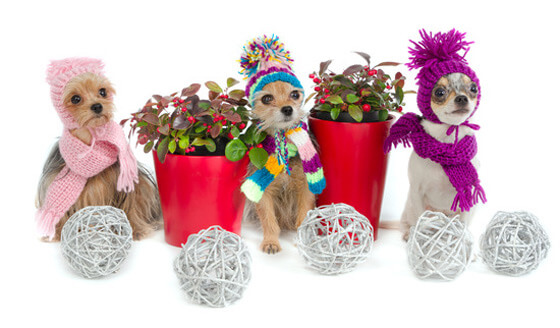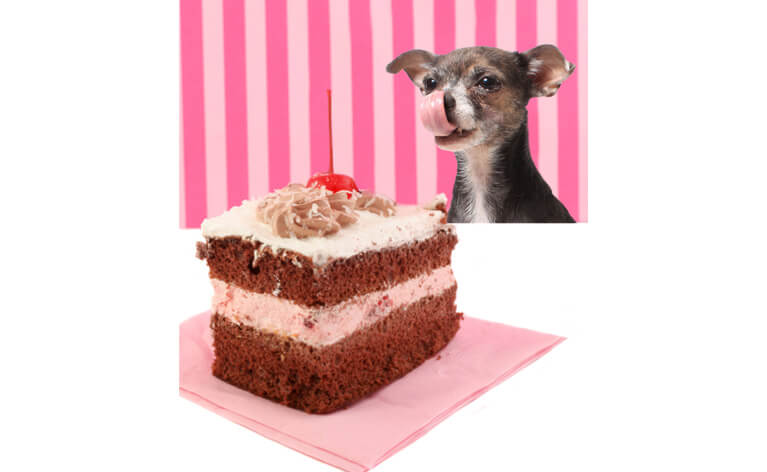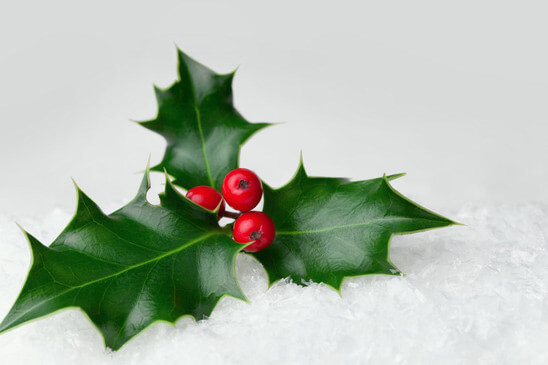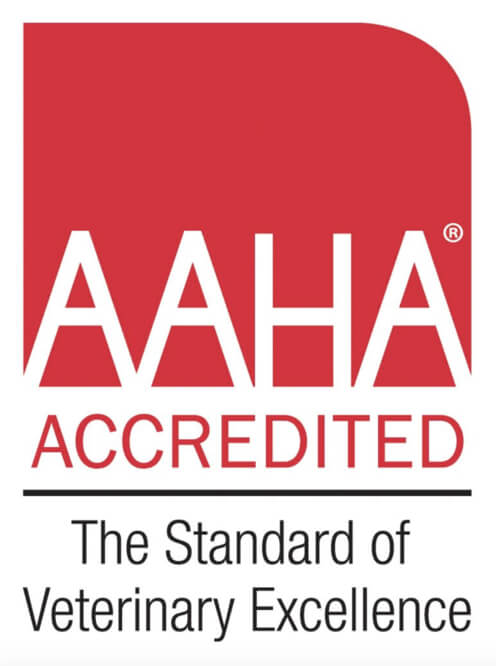
With the holidays are here and it’s a good idea to be mindful of some of the potential dangers that can present themselves as we prepare and decorate our homes for the holiday gatherings. Here are some of the top harmful holiday related items:
1. Tinsel, Wrapping Materials and Ornaments
 Although Tinsel isn’t inherently toxic to pets, if ingested it can cause a serious problem as it moves through your pet’s digestive system. It can become entangled and twisted in your pet’s intestines, create blockages and even lacerations depending on the nature of the material. It is especially appealing to cats due to the shiny surface and movement that it creates. Ribbons and bows fall into the same category and can also be dangerous if ingested, potentially becoming a choking hazard as well as possibly becoming twisted and entangled in your pet’s intestines.
Although Tinsel isn’t inherently toxic to pets, if ingested it can cause a serious problem as it moves through your pet’s digestive system. It can become entangled and twisted in your pet’s intestines, create blockages and even lacerations depending on the nature of the material. It is especially appealing to cats due to the shiny surface and movement that it creates. Ribbons and bows fall into the same category and can also be dangerous if ingested, potentially becoming a choking hazard as well as possibly becoming twisted and entangled in your pet’s intestines.
Similarly, holiday lights and ornaments also can be intriguing to cats and dogs alike. Ornaments and lights are often fragile and made of glass or thin aluminum that can easily shatter and fragment if chewed on. The sharp fragments can lacerate your pet’s mouth and internal organs if eaten and swallowed.
2. Food and Edible Items
Holiday gatherings usually mean big dinners and lots of treats. Here are the top items to be mindful of while you are preparing for your holiday spread.
Bones and fat trimmings
Bones, especially smaller thinner bones can splinter and cause choking or internal obstructions and lacerations if the pieces are ingested. Trimmed fat, both cooked and non-cooked can potentially cause pancreatitis.
Chocolate
 Chocolate may be America’s favorite flavor. We like chocolate candy, ice cream, chocolate drinks, chocolate cakes, just about anything with chocolate. We may want to share our favorite treat with an eager pet but it is best to think twice and reach for the dog biscuits instead.
Chocolate may be America’s favorite flavor. We like chocolate candy, ice cream, chocolate drinks, chocolate cakes, just about anything with chocolate. We may want to share our favorite treat with an eager pet but it is best to think twice and reach for the dog biscuits instead.
Pancreatitis, vomiting, diarrhea, and abdominal pain are just the beginning of this disaster. Remember, in the case of pancreatitis, it is the fat that causes the problem more than the chocolate itself.
The fat and sugar in the chocolate can create an unpleasant but temporary upset stomach. This is what happens in most chocolate ingestion cases.
Chocolate is, however, directly toxic because it contains theobromine. Theobromine is found in the Cacao seed from which Chocolate is derived. The process of making Chocolate from Cacao seeds produces Chocolate liquor, which is the liquid that results from grinding the hulled cacao beans. The more chocolate liquor there is in a product, the more theobromine there is.
This makes baking chocolate the worst for pets, followed by semisweet and dark chocolate, followed by milk chocolate, followed by chocolate flavored cakes or cookies. Signs of toxicity from theobromine causes:
- Vomiting
- Diarrhea
- Hyperactivity
- Tremors
- Seizures
- Racing heart rhythm progressing to abnormal rhythms
- Death in severe cases
Toxic doses of theobromine are 9 mg per pound of dog for mild signs, up to 18 mg per pound of dog for severe signs. Milk chocolate contains 44 mg / ounce of theobromine while semisweet chocolate contains 150 mg per ounce, and baking chocolate contains 390 mg per ounce.
It takes nearly four days for the effects of chocolate to work its way out of a dog’s system. If the chocolate was only just eaten, it is possible to induce vomiting; otherwise, hospitalization and support are needed until the chocolate has worked its way out of the system. If you think your pet has eaten chocolate, please call Glen Oak immediately!!
Nuts
Whole nuts and nut ingredients found in many baked goods and desserts can have an adverse effect on your pet’s health ranging from an upset stomach and gastrointestinal distress to toxicity in some cases.
Almonds, non-moldy walnuts and pistachios top the list of nuts to avoid letting your pet eat and moldy walnuts, and Macadamia nuts can be toxic.
3. Holiday Plants
 Those pretty decorative arrangements are a part of the holidays, but some can be poisonous and even deadly in extreme cases. Lily plants are particularly poisonous and harmful for cats. Ingestion of even a couple leaves can lead to liver failure and if left untreated a fatal outcome.
Those pretty decorative arrangements are a part of the holidays, but some can be poisonous and even deadly in extreme cases. Lily plants are particularly poisonous and harmful for cats. Ingestion of even a couple leaves can lead to liver failure and if left untreated a fatal outcome.
Other plants to avoid:
- Poinsettias – Can cause oral irritation, stomach upset and often vomiting.
- Mistletoe – Can cause vomiting and diarrhea, difficulty breathing, collapse, seizures and even death when ingested in large doses.
- Christmas tree pine needles – Can produce oral irritation, vomiting, diarrhea, and abdominal pain.
- Holly – Can cause stomach upset, vomiting, diarrhea.
It’s important to pay attention to your pet’s interest in the plants. Avoid bringing toxic live plants into your home at all if possible. If you are unsure about a plant’s toxicity, look it up here. Monitor your pet’s interest in eating plants, and place plants out of reach. Check the plants for any signs of chewing or missing leaves. If unsure, plastic plants are an option (with care taken not to let those get ingested, either!).
Ashley Rossman DVM, CVA

